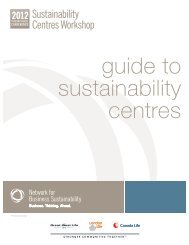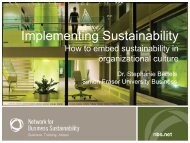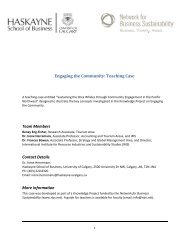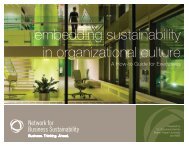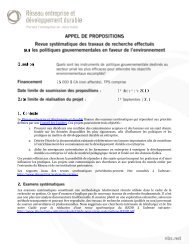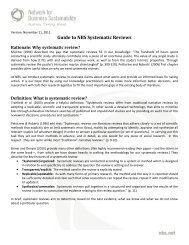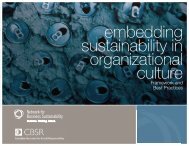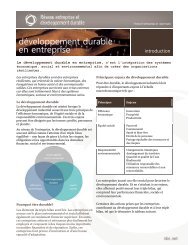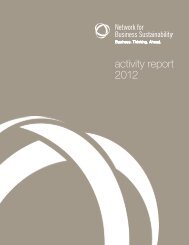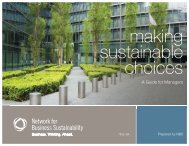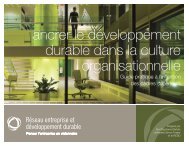Systematic Review - Network for Business Sustainability
Systematic Review - Network for Business Sustainability
Systematic Review - Network for Business Sustainability
You also want an ePaper? Increase the reach of your titles
YUMPU automatically turns print PDFs into web optimized ePapers that Google loves.
In the Organizational Trans<strong>for</strong>mation context, firms<br />
explore ways of shifting the organizational mindset<br />
from “doing less harm” to “creating shared value” and<br />
“delivering wider benefits <strong>for</strong> society.” Firms operating in<br />
this context also increasingly focus, either incrementally<br />
or systemically, on the social dimension of sustainability,<br />
which emphasizes the need to address unmet human<br />
and societal needs. This is a shaping logic that goes<br />
beyond an internal, operational focus on greening<br />
to a more external, strategic focus on sustainable<br />
development (Hart, 1997).<br />
Innovation in the context of Organizational<br />
Trans<strong>for</strong>mation involves small-scale explorations and<br />
experimentation not only in products and services but<br />
also in social and organizational aspects, which may<br />
lead to new business models. Such innovation is more<br />
challenging but offers significantly higher potential to<br />
achieve more ambitious sustainability-oriented goals<br />
than the gradual incrementalism characteristic of<br />
Operational Optimization.<br />
In this context, an awkward juxtaposition can occur<br />
between “good business economics of cost savings<br />
through environmental investments” and “strategic reorientation<br />
of the firm around sustainability concerns,”<br />
in which the firm takes on new responsibilities regarding<br />
environmental and social development. Many firms in<br />
this category experiment within an existing institutional<br />
framework at, <strong>for</strong> example, the level of the product or<br />
the strategic business unit (SBU).<br />
SYSTEMIC RELATIONSHIPS<br />
<strong>Sustainability</strong> develops greater significance in the firm,<br />
making new types and degrees of collaboration evident.<br />
1. New opportunities can be explored at the interfaces<br />
of previously unrelated industries<br />
2. Collaborations become increasingly interdependent<br />
3. New innovation plat<strong>for</strong>ms can be tested: e.g.<br />
reverse innovation, jugaad innovation and resourceconstrained<br />
innovation<br />
1. New opportunities can be explored at the<br />
interfaces of previously unrelated industries<br />
The Kalundborg industrial symbiosis project is a<br />
powerful illustration of this type of interdependence.<br />
Eight firms co-operated to convert their environmental<br />
problems into business opportunities, whereby<br />
one company’s waste material or energy became<br />
another’s resources. By pooling material resources,<br />
the Kalundborg companies derived synergistic<br />
environmental and economic benefits (Birkin, Polesie &<br />
Lewis, 2009).<br />
In a Swedish multi-sectoral initiative, the Landskrona<br />
industrial symbiosis program brought more than 20<br />
firms and three public organizations together to search<br />
<strong>for</strong> novel solutions to sustainability challenges. The<br />
initiative focused on the following:<br />
• Defining the problem<br />
• Searching <strong>for</strong> benefits at inter-sectoral interfaces<br />
• Enhancing learning through inter-organizational<br />
collaboration<br />
This facilitated exploration paved the way <strong>for</strong><br />
innovations typified by the discovery of opportunities<br />
at the interfaces of previously unrelated industries. In<br />
one case, wastewater from car glass manufacturing<br />
replaced the drinking-quality water that had previously<br />
been used in the wet scrubber used <strong>for</strong> removing<br />
Innovating <strong>for</strong> <strong>Sustainability</strong> 37



